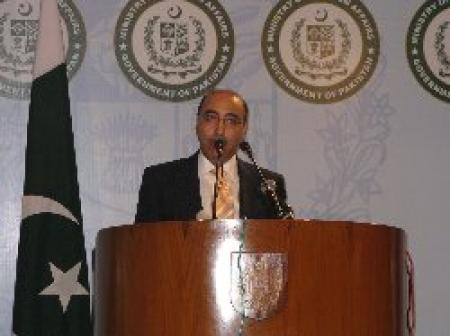ID :
151806
Tue, 11/30/2010 - 13:53
Auther :
Shortlink :
http://m.oananews.org//node/151806
The shortlink copeid
Pakistan accuses WikiLeaks of spoiling ties with S.Arabia

Islamabad, Nov 30, IRNA-- Pakistani Presidential spokesman here Monday accused WikiLeaks of spoiling its relations with Saudi Arabia.
WikiLeaks on Sunday posted 220 cables, which also included about Pakistan’s nuclear program and President Asif Zardari.
The cables quoted comments from Saudi King Abdullah about the leaders of Iraq and Pakistan.
The king called President Asif Ali Zardari of Pakistan the greatest obstacle to that country’s progress. “When the head is rotten,” he said, “it affects the whole body.”
“The so-called WikiLeaks tried to spoiled relations between Pakistan and Saudi Arabia,” Presidential spokesman Farhatullah Babar said.
He said President Zardari considers the Saudi monarch as his elder brother, adding Pakistan and Saudi Arabia are two brother Islamic countries. He said the WikiLeaks cables are aimed at creating misunderstanding between the two countries.
Meanwhile Pakistan’s Foreign Ministry has termed as irresponsible behavior, cables by the WikiLeaks.
WikiLeaks cables says: “Since 2007, the United States has mounted a highly secret effort, so far unsuccessful, to remove from a Pakistani research reactor highly enriched uranium that American officials fear could be diverted for use in an illicit nuclear device.
In May 2009, former US Ambassador Anne W. Patterson reported that Pakistan was refusing to schedule a visit by American technical experts because, as a Pakistani official said, “if the local media got word of the fuel removal, ‘they certainly would portray it as the United States taking Pakistan’s nuclear weapons,’ he argued.
The cables show that nearly a decade after the attacks of Sept. 11, 2001, the dark shadow of terrorism still dominates the United States’ relations with the world. They depict the Obama administration struggling to sort out which Pakistanis are trustworthy partners against Al Qaeda, adding Australians who have disappeared in the Middle East to terrorist watch lists, and assessing whether a lurking rickshaw driver in Lahore, Pakistan, was awaiting fares or conducting surveillance of the road to the American Consulate.
Foreign Office spokesman Abdul Basit said Pakistan is taking stock of the revelations concerning Pakistan.
The spokesman said the irresponsible issuance of sensitive documents regarding foreign and defence affairs is a ‘condemnable act’. He said the US had already iformed Pakistan about these reports before they were issued./end
WikiLeaks on Sunday posted 220 cables, which also included about Pakistan’s nuclear program and President Asif Zardari.
The cables quoted comments from Saudi King Abdullah about the leaders of Iraq and Pakistan.
The king called President Asif Ali Zardari of Pakistan the greatest obstacle to that country’s progress. “When the head is rotten,” he said, “it affects the whole body.”
“The so-called WikiLeaks tried to spoiled relations between Pakistan and Saudi Arabia,” Presidential spokesman Farhatullah Babar said.
He said President Zardari considers the Saudi monarch as his elder brother, adding Pakistan and Saudi Arabia are two brother Islamic countries. He said the WikiLeaks cables are aimed at creating misunderstanding between the two countries.
Meanwhile Pakistan’s Foreign Ministry has termed as irresponsible behavior, cables by the WikiLeaks.
WikiLeaks cables says: “Since 2007, the United States has mounted a highly secret effort, so far unsuccessful, to remove from a Pakistani research reactor highly enriched uranium that American officials fear could be diverted for use in an illicit nuclear device.
In May 2009, former US Ambassador Anne W. Patterson reported that Pakistan was refusing to schedule a visit by American technical experts because, as a Pakistani official said, “if the local media got word of the fuel removal, ‘they certainly would portray it as the United States taking Pakistan’s nuclear weapons,’ he argued.
The cables show that nearly a decade after the attacks of Sept. 11, 2001, the dark shadow of terrorism still dominates the United States’ relations with the world. They depict the Obama administration struggling to sort out which Pakistanis are trustworthy partners against Al Qaeda, adding Australians who have disappeared in the Middle East to terrorist watch lists, and assessing whether a lurking rickshaw driver in Lahore, Pakistan, was awaiting fares or conducting surveillance of the road to the American Consulate.
Foreign Office spokesman Abdul Basit said Pakistan is taking stock of the revelations concerning Pakistan.
The spokesman said the irresponsible issuance of sensitive documents regarding foreign and defence affairs is a ‘condemnable act’. He said the US had already iformed Pakistan about these reports before they were issued./end





